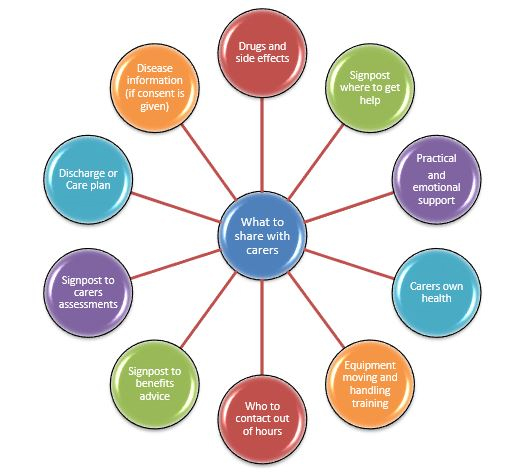Heading 2
Patient confidentiality means healthcare staff have a duty to keep information about the patient and their care private. If staff shared information about a patient without their agreement, they would have ignored that duty and could even possibly lose their job. The most important thing for healthcare staff is that the patient has agreed that information about them can be shared with you (their carer).
Many carers and patients do not know that the patient must agree before any information can be shared so it is really important that this is discussed openly between everyone involved. However, staff also know that sharing information can be important to the health and wellbeing of both the patient and the carer. Staff are aware that it makes things easier for both the patient and the carer are included in discussions and decisions about the patient's care. These can be about practical, financial or personal things. So you can see that this can be a difficult situation for both staff and carers and why it helps to agree with the healthcare staff in advance on what can be discussed with carers.
For example, a discussion could take place between healthcare staff and the patient (if their health allows this to happen); the carer and healthcare staff.
This has been likened to a triangle of care (The Triangle of Care, Carers Trust 2013*). The triangle of care can be seen as the professional, patient and carer all working together to best meet the needs of the patient – a three-way partnership.
When information about a patient can be shared?
Sometimes healthcare staff have to break this rule of confidentiality, which means they must share information with other people. Staff have clear guidelines that they must follow if this happens.
What happens if a patient refuses to give consent to share information?
When a patient refuses to give consent, carers need to be given enough information so they can care for the patient when they leave hospital. However, it is always best to discuss sharing information with the patient, carer and the healthcare staff. If healthcare staff give general information about an illness, medication or emotional and practical support for carers this does not breach patient confidentiality.
What is meant by ‘lacking capacity?'
This is when a patient is not able to understand and use the information they are being given about their care. Healthcare staff would then provide the best care and would often involve a carer in decisions about that care.
Power of Attorney or Guardianship
Some carers have a Welfare Power of Attorney or have legal Guardianship for the person they care for. As long as these are registered, the carer has the right to make decisions about the patient. More information can be found from the Office of the Public Guardian (visit: www.publicguardian-scotland.gov.uk/index.asp).
There are other publications that give you more detailed information such as Mental Welfare Commission for Scotland Carers and Confidentiality
What healthcare staff can tell a carer

Other useful things to consider
As a carer you should be considered as an equal partner in the care of the patient. Your needs should be considered separately from the person you care for, as they may be different or may even clash. If you regularly provide a substantial amount of care, you can ask your local social work department for a Carer’s Assessment.
- NEXT PAGE: I am a Carer - Publications
- LAST REVIEWED ON: February 4, 2025